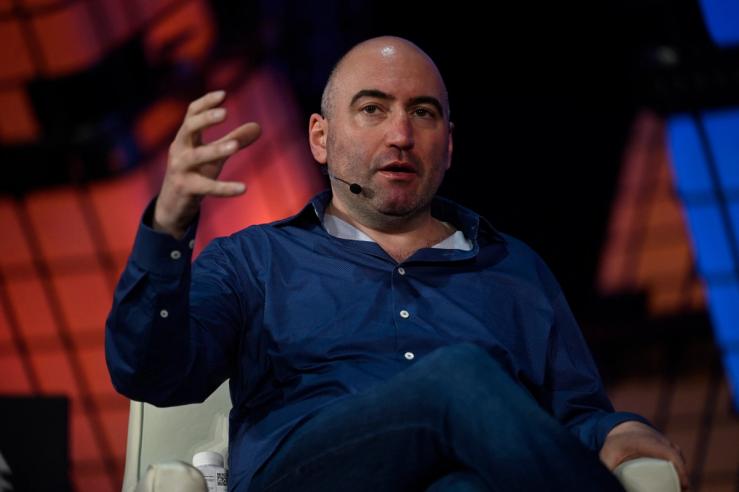The Scene
Few return-to-office mandates have caused as much fallout as Grindr’s. George Arison, who became CEO of the gay dating app in late 2022, estimates that 60% of its staff left after he changed its remote-work policy the following year.
President Joe Biden’s National Labor Relations Board charged the company with violating labor law by requiring workers to be in the office two days a week. The Communications Workers of America accused Grindr of union-busting. Arison, who met his husband through the app, says he knew that the job looked complicated, “but it turned out to be 10x more complicated.”
Two years on, though, he is unrepentant. Grindr’s revenues are up 25% year-over-year, its stock has more than doubled in 12 months, and it is bucking the “app fatigue” seen by the likes of Bumble, which cut about 30% of its staff this week. Arison is wary of the “extreme monetization” that has turned off some app users, but he’s rolling out an ambitious list of new products to expand into health and wellness, travel, and luxury experiences — and many of which apply AI tools to his company’s trove of data.
Earlier in his career, Arison founded Shift, an online marketplace for used cars, and Taxi Magic, which powers the Curb app for cabs in cities including New York. Here’s how he’s trying to bring that startup ethos to Grindr.
This interview has been condensed and edited for clarity.
In this article:
The View From GEORGE ARISON
Andrew Edgecliffe-Johnson: What attracted you to this job?
George Arison: I thought I could do what I love and just build a business, but in building a business, I could have a very positive impact on people like me. What I didn’t expect is that the team needed to be completely turned around. I assumed that it’s a tech company, so everyone would be working like they do at a tech company. At Shift, no one ever thought about doing less than 60 hours a week. But then I showed up at Grindr, and it [was] like water and oil. A very large chunk of our employees had been in an environment where working four hours a day was viewed as a lot.
So, how did you try to change that?
I knew that a big chunk of the employees were going to have a problem with what I had to say, but I didn’t realize how big a chunk it would be. But I’m not an apologist for myself. I love people to challenge me on stuff, but ultimately, there’s a two-way door decision and a one-way door decision. And when the decision’s made, let’s get on and execute on it.
I had one manager send me an email saying, “George, you’re saying you want to work more than 9-to-5, but I barely can get my team to work 9-to-1.” So I asked everybody to create a stack rank of their team members. And we just said, “OK, the bottom 12% is not going to stay,” which partly was a signal to the team that we have new norms here now. That was in January, and then we did it again in May.
I had also told them that we were going to come back to the office, and a portion of the employees said, “Hey, we want to unionize.” I’m like, “Well, you can unite all you want, but we’re still going to do the things that we’re going to do.” That forced people to make a choice, and a lot of them chose to leave, which opened up a very blank slate.
It was very risky, because we lost a lot of people, but then we rebuilt the team from scratch. We peaked at 225 people, and we’re in the 150 range now. So we’re still nowhere near the peak, but we don’t need to be, because we now have a totally different talent bar.
You’re building Woodwork [a side brand selling erectile dysfunction medications] as a mini startup within the business. Why are you doing it that way?
A VC on my board [likes to] say that doing a startup is like, you get some money, you set some milestones, and the question is, can you hit those milestones prior to running out of money? And then you can go get more money. When you have a big company behind you, that does not exist. It’s like, “Well, there’s more money available to me, what’s going to result in me being shut down?”
There’s also the assumption that, because I have a big company behind me and [its core] product is working, my [new] product will also work, which I think is a huge error in judgment. I don’t want the team that’s working on Woodwork to have any of those assumptions. So instead of saying, “Hey, we’re going to launch it everywhere,” I’m [saying], “No, you’re going to limit yourself to two geographies. You’re going to make it work there [before expanding].” They asked for more data [to support more launches but I said,] “No, you’re getting enough data now. Pick up the phone and call the users to figure out why they’re buying or why they’re not buying, which is exactly what a startup would do.”
I want them to go through all the pain that a startup goes through, because that’s what makes companies go from zero to one.
You didn’t found this company, but does a founder bring something different to the CEO’s role?
I realized after I joined Grindr — I wish I had realized before — that at Shift, the level of trust in me was extremely high, and that’s true at every other startup I’ve done, because no employee will join a startup unless they trust the founder. Versus at Grindr, you walk in and there are already employees there, so you need to earn that trust in a very different way.
Most founders lose money, so you have to be a little bit insane to believe that you will do whatever it is that you’re doing better than anybody else in the world. We’re much more prone to take risks, because we need to take risks to be successful. I don’t think a non-founding CEO would have been as willing to say, “Guys, this is what we’re going to do. I don’t really care if you walk away or not.”
As you use AI more, are you making different assumptions about how many people you need to hire?
We’re going to need more people to become a billion-dollar revenue company. [But we’re hiring] more senior principals, people who are experienced at things, know how things are done, and are willing to be [individual contributors]. Because they’ll need to be managing synthetics rather than managing people — not today, but in the next 24 months.
I don’t want to hire any engineers who are not in the native AI mode, even if they’re not working on a native AI product. I want them to be constantly thinking, “How do I increase my productivity 2x or 4x?” — not, “How do I get 20% more from AI?” [but,] “How do I fundamentally change and transform myself to be something I was previously not?”
How are you using AI yourself?
After my last board meeting, I fed the entire board [briefing] pack, my two most recent companywide speeches, and some memos into ChatGPT. I had gone through our earnings call, callbacks, and board meeting all in rapid succession, so I was pretty tired, but even while resting that weekend, I produced five memos and spammed my team with follow-ups and to-do’s. It would normally take me two weeks to do all those things. So that was pretty amazing. Some amazing world is coming if you manage to let it.
Notable
- Grindr is testing features like an AI “wingman” and AI-generated chat summaries a la Gmail with a select group of 10,000 power users, Mashable writes.
- Bumble cut its staff by 30%, The Wall Street Journal writes, the latest dating app company to see a drop-off in business as Gen Z gives up on swiping and scrolling.
- The future of the dating world might be old-school matchmaking: Luxury dating services are taking off, Bloomberg reports.


